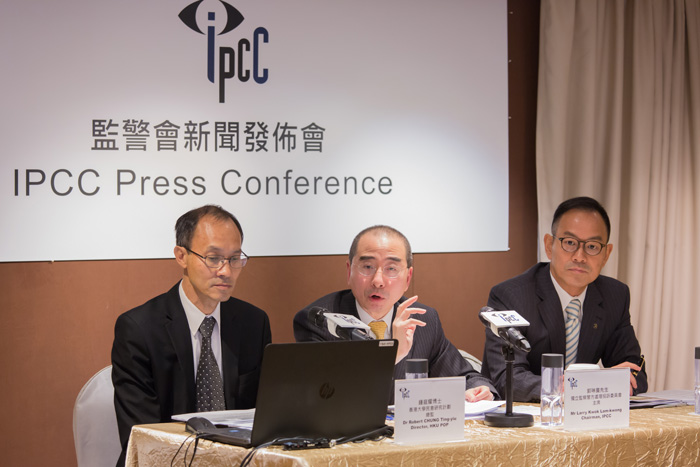A sexual assault complaint against a Hong Kong police officer who allegedly touched the breast of a female journalist while she covered a 2020 street protest has been dropped because the force cannot identify the officer.

Freelance reporter Jasmine Leung alleged that a riot police officer touched her breast at the protest and, when she complained to other officers in an attempt to get his unique identification (UI) number, she was pepper-sprayed in the face by one of his colleagues.
At the time, Leung was reporting on a protest near Langham Place mall in Mong Kok for a foreign media outlet last January 26. Police were dispersing crowds and protesters by pushing a human cordon southwards to Shantong Street, when one riot police officer came forward and allegedly touched her left breast.
Her complaint to the Complaint Against Police Office (CAPO) — an internal department of the force — alleged that the officer in question committed misconduct when he squeezed her breast for three to five seconds, that he failed to display his warrant card and did not provide his UI number upon quest, and that a second officer did not give warning before pepper-spraying her.
“I stood on the side of the pavement watching an old man being pepper-sprayed, when an officer touched my left breast,” she told HKFP. He did not say anything to her but disappeared from sight soon after.
She said she tried to identify the officer by asking his colleagues on scene who he was and what his identification number was. “They said: ‘it did not happen, you go look for him yourself,'” Leung said. “People were pushing us and suddenly I was pepper-sprayed on the face.”
Identity not ascertained
The CAPO’s reply to Leung last Thursday said the first officer — whom she alleged touched her breast and did not show his warrant card — could not be identified after a full investigation “because the scene was chaotic and the officer concerned was wearing a mask.”
“The available evidence suggests that there might have been a physical contact between you and the officer concerned but it did not last as long as 3-5 seconds as alleged,” the letter read.
The case was classified as “not pursuable.”

Her complaint against the second officer who pepper-sprayed her without warning was also dismissed. The letter from the CAPO said that there was an absence of “independent evidence” and therefore the allegation had been classified as “unsubstantiated.”
The investigation’s findings were also examined and endorsed by the Independent Police Complaints Council (IPCC), the CAPO response read.
A video of the incident showed Leung dismissed volunteer medics offering their assistance and tried to complain to a Police Public Relations Branch (PPRB) officer about the incident. The female officer responded by pushing her arm and said: “Please move.”
Leung said she planned to file an internal appeal against the decision.
“Physical touching was unavoidable during chaotic scenes like [the protests] but this case [clearly shows] how a female loses power in addressing issues like sexual harassment in the face of authority. Justice is denied,” she wrote in a tweet.

IPCC procedures state that complaints against the police “made in good faith and are not vexatious or frivolous” may be classed as “reportable complaints,” while those that were made anonymously or by those not directly involved in the incident are classed as “notifiable complaints.”
Upon receiving reportable complaints and investigation findings from the CAPO, the IPCC may then endorse these findings, or request for clarification or re-investigation if discrepancies were found.
In 2019/2020, the IPCC endorsed 87 per cent of all reportable complaint findings it received from CAPO, according to the independent body’s annual report. CAPO ruled that over 82 per cent of the complaints it investigated were either “unsubstantiated” or involved “no fault.”
In response to HKFP’s enquiry, an IPCC spokesperson said it will not comment on individual cases, although complainants may seek a review of the case classification through CAPO’s existing mechanism.
HKFP has reached out to the police for comment.
Update 21.7.2021: This story has been updated with IPCC’s response.
Support HKFP | Policies & Ethics | Error/typo? | Contact Us | Newsletter | Transparency & Annual Report | Apps
Help safeguard press freedom & keep HKFP free for all readers by supporting our team

LATEST FROM HKFP
HKFP has an impartial stance, transparent funding, and balanced coverage guided by an Ethics Code and Corrections Policy.
Support press freedom & help us surpass 1,000 monthly Patrons: 100% independent, governed by an ethics code & not-for-profit.










